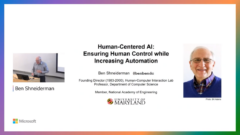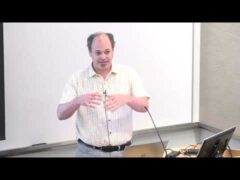A Cross-modal Audio Search Engine based on Joint Audio-Text Embeddings
- Benjamin Elizalde | Carnegie Mellon University
Ad-hoc audio clips, such as those from smart speakers, social media apps, security cameras and podcasts, are being recorded and shared online on a daily basis. For a variety of applications, it is important to be able to search effectively through these recordings. Web-based multimedia search engines – that independently index content or textual tags — are not suitable for ad-hoc audio recordings. This is because of the absence of reliable human or machine-generated tags, and low specificity of audio content in such recordings.
In this work, we propose to connect audio and text modalities through a joint-embedding framework that allows the two modalities to exchange semantic information with each other within a shared latent space. Thus, we enable content- and text-based features associated with ad-hoc audio recordings to be mapped together and compared directly for cross-modal search and retrieval. We also show that these jointly-learnt embeddings outperform solo embeddings of any one modality. Thus, our results break ground for a cross-modal Audio Search Engine that permits searching through ad-hoc recordings with either text or audio queries.
Speaker Details
Benjamin Elizalde is a PhD student at Carnegie Mellon University under the supervision of Prof. Bhiksha Raj. His current research focuses on Machine Learning for Audio. Previously, Benjamin worked as a Staff Researcher at ICSI-UC Berkeley in the Audio & Multimedia lab.
-
-

Shuayb Zarar
Principal Applied Scientist Manager
-
-
Series: Microsoft Research Talks
-
Decoding the Human Brain – A Neurosurgeon’s Experience
- Dr. Pascal O. Zinn
-
-
-
-
-
-
Challenges in Evolving a Successful Database Product (SQL Server) to a Cloud Service (SQL Azure)
- Hanuma Kodavalla,
- Phil Bernstein
-
Improving text prediction accuracy using neurophysiology
- Sophia Mehdizadeh
-
Tongue-Gesture Recognition in Head-Mounted Displays
- Tan Gemicioglu
-
DIABLo: a Deep Individual-Agnostic Binaural Localizer
- Shoken Kaneko
-
-
-
-
Audio-based Toxic Language Detection
- Midia Yousefi
-
-
From SqueezeNet to SqueezeBERT: Developing Efficient Deep Neural Networks
- Forrest Iandola,
- Sujeeth Bharadwaj
-
Hope Speech and Help Speech: Surfacing Positivity Amidst Hate
- Ashique Khudabukhsh
-
-
-
Towards Mainstream Brain-Computer Interfaces (BCIs)
- Brendan Allison
-
-
-
-
Learning Structured Models for Safe Robot Control
- Subramanian Ramamoorthy
-
























